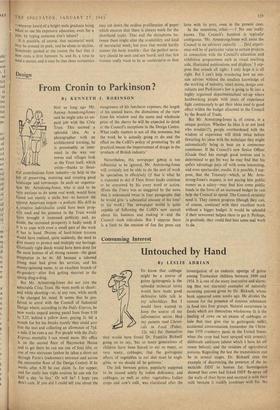Design
From Cronin to Parkinson?
By KENNETH J. ROBINSON
NOT so long ago Mr. Antony Armstrong-Jones said he might take an un- paid job with the Civic Trust. This seemed a splendid idea. As a photographer with an architectural training, he is presumably as inter- ested in the way our towns and villages look as the Trust itself, which exists—thanks to finan- cial contributions from industry—to help in the JS1t) of preserving, restoring and creating good lixndscape and townscape. In such an organisa- tion Mr. Armstrong-Jones, who is said to be very anxious to do some real work, would have found not merely a niche but—to borrow the syrent American jargon—a podium. His skill as a !creative individualist could have been prop- • e,9y used and his presence in the Trust would have brought it increased publicity and, no doubt, the increased prosperity it badly needs if It is to cope with even a small part of the work It has in hand. Dozens of hard-bitten tycoons would have realised, quite suddenly, the need to give money to protect and multiply our heritage. Gloriously right deeds would have been done for tte most human of all wrong reasons—the great temptation to be IN. All because a talented Young man had given his services, and his ffioney-spinning name, to an excellent branch of do-goodery—after first getting married in the spring ding-a-ding.
But Mr. Armstrong-Jones did not join the admirable Civic Trust. He went north to shoot : and while shooting—or, at any rate, while north --he changed his mind. It seems that he pre- ferred to enrol with the Council of Industrial Design where, according to the Daily Express, he now works unpaid among pastel hues from 9.10 to 5.25, behind a yellow door, paying 2s. 6d. a month for his tea breaks (surely they could give him the tea) and collecting an allowance of 71d. a mile if he runs a car. For people with the Daily Express mentality I can reveal more. His office is on the second floor of Haymarket House and to get there he can use one of four lifts, or one of two staircases (unless he takes a short cut through Forte's tradesmen's entrance and across the mezzanine floor of the Design Centre). If he works after 6.30 he can claim 5s. for supper, and for really late night sessions he can ask for half a day 'in lieu.' Or will he? I hope you don't care. If you did I could tell you about the meagreness of his luncheon expenses, the length of his annual leave, the dismalness of the view from his window and the name and wholesale price of the sherry he will be expected to drink at the Council's receptions in the Design Centre. What really matters is not all this nonsense, but the work he is actually going to do and the effect on the ColD's policy of promoting `by all practical means the improvement of design in the products of British industry.'
Nevertheless, this newspaper gossip is too influential to be ignored. Mr. Armstrong-Jones will certainly not be able to do the sort of work he specialises in effectively (if that is what he is expected to do) if Fleet Street hacks continue tc' be overawed by his every word or action. (Even the. Times was so staggered by the news that it announced twice in four paragraphs that he would give 'a substantial amount of his time' to his work.) The newspaper world is quite capable of following the ColD's new recruit about his business and making it—and the Council—look ridiculous. But I suppose there is a limit to the amount of fun the press can have with its prey, even in the present case.
In the meantime, what ? No one really knows. The Council's handout is typically ambiguous. 'Mr. Armstrong-Jones will assist the Council in an advisory capacity . .. [his] experi- ence will be of particular value to certain projects in connection with the Council's education and exhibition programmes such as visual teaching aids, illustrated publications and displays.' I sup- pose that sounds all right: I only hope it is all right. But I can't help wondering how an out- side adviser without the smallest knowledge of the working of industry, retail stores, design con- sultants and Parkinson's law is going to fit into a highly organised departmentalised set-up where hardworking people with years of experience fight continuously to get their ideas used to good effect within the budget allocated to the Council by the Board of Trade.
But Mr. Armstrong-Jones is, of course, in a unique position. Whether he likes it or not (and who wouldn't?), people overburdened with the wisdom of experience will think twice before thwarting his ideas with the technique they might automatically bring to bear on a commoner commoner. If the Council's new Senior Officer (Grade One) has enough good notions and is determined to get his way he may find that his unfair advantage pays off with some interesting, and even spectacular, results. It is possible, I sup- pose, that the Treasury—which, •at Mr. Arm- strong-Jones's request, is not paying him public money as a salary—may find him some public funds in the form of an increased budget he can help the Council to spend. The Council certainly need it. They cannot progress (though they can, of course, continue) with their excellent work without a bigger budget. It would be splendid if their newcomer helped them to get it. Perhaps, in gratitude, they could find him some real work to do.










































 Previous page
Previous page